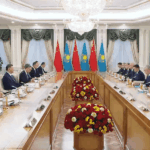Can algorithms reach space? This is not a scene from a science fiction story.
At the 4th Pazhou Algorithm Competition’s Ecological Empowerment Conference, the challenge presented by Guangzhou Jiazhi Huixing Technology Co., Ltd. attracted attention—making algorithms “fly into space.” The code written by participants will no longer only run on ground servers but is expected to be sent to orbital satellites to analyze Earth from a real space perspective.
“Surprisingly, the champion was an artificial intelligence company from the medical field. Their precise image recognition algorithm brings new inspiration to industrial development.” The general manager of Jiazhi Huixing expressed that the Pazhou Algorithm Competition’s “open competition approach” helps companies connect with top-tier teams, opening broad perspectives for industrial upgrading.
Since its launch in April, this year’s competition has attracted 8,131 teams from over 30 countries. Leading industry companies and institutions, as well as numerous renowned university teams, actively participated.
“Over the past four years, the Pazhou Algorithm Competition has evolved beyond just a competition; it has become a global platform that gathers industries, attracts talent, and promotes investment through competitions.” The competition committee head stated that with the event’s organization, the artificial intelligence industry is accelerating its concentration and thriving here.
“Putting algorithms on satellites can reduce the amount of data transmission, especially avoiding ineffective data transfers. It can also more efficiently analyze road congestion and assess infrastructure needs, providing support for urban planning and traffic management.” The general manager explained that while the challenge appears simple, it presents numerous difficulties. Participants must deeply optimize, trim, and compress traditional algorithms to adapt them to satellite computing environments under harsh conditions of low satellite communication bandwidth and short transmission windows. The algorithms must quickly and accurately identify road networks with high precision and no omissions.
This year’s competition featured 13 practical business scenario challenges focusing on various fields including transportation, healthcare, power, education, and sports.
As another “challenge setter,” Guangzhou Yundie Technology Co., Ltd. targeted the artificial intelligence sports track, releasing intelligent judgment tasks in sports scenarios. Participating teams were required to use visual algorithms to analyze real-time movement results of multiple athletes in videos.
“With the 15th National Games approaching, we hope to apply the competition results to key urban locations, using technology to promote public fitness,” said the Yundie Technology representative.
“Hosting this competition aims to target real business scenarios and focus on practical applications,” said the Pazhou Management Committee deputy director. During the topic collection process, organizers repeatedly discussed with companies and experts to ensure each challenge delivers practical results.
Guangzhou Weilai Sports Technology Co., Ltd. won first place in Yundie Technology’s challenge. The company’s technical lead explained that during finals, their team faced the biggest challenge of accurately measuring individual jump rope counts for 10 people in the same video scene. “The ropes are thin, the scenes are complex, and precision requirements are high. Directly capturing rope features proved very difficult. The team innovatively used hand movement correlation to enhance features, improving stability and accuracy in complex scenarios.”
The Weilai Sports team underwent multiple discussions and repeated verifications, continuously optimizing their pose recognition algorithm model. Ultimately, their outstanding performance stood out among many high-level teams, earning them a 100,000 yuan prize.
How does the competition attract top teams? It addresses this through competition systems and other aspects. This year’s event invited top artificial intelligence teams to deeply participate in planning and execution, providing全程 advisory support to help the competition become a “platform” for algorithmic thinking碰撞 and尖端 competition.
“Here, we not only have access to cutting-edge computing power support but also benefit from the artificial intelligence ecosystem formed by major tech companies.” A product lead from another company noted that since moving to Pazhou last year, “whether we visit partner companies or they come for discussions, it only takes a few minutes. Communication costs have significantly decreased, and response speeds have rapidly improved.” The Pazhou Algorithm Competition helped their company embark on a high-quality development path—achieving profitability turnaround, surpassing 7,000 client partnerships, and realizing a transformation from “participation” to “takeoff.”
The competition serves as both a project “power source” and a talent “reservoir.” Since 2022, through the competition, over 60 companies have established operations in Guangzhou’s Haizhu District. To date, the district has gathered over 7,000泛 artificial intelligence companies.



